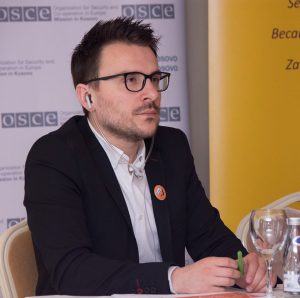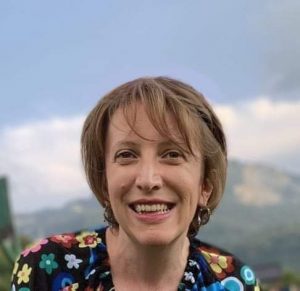#SOC Interview: Gender of Security
Author: Nejra Agić
On the occasion of the 20th anniversary of the adoption of Resolution 1325 by United Nations Security Council, the Sarajevo Open Center and the OSCE Mission to Bosnia and Herzegovina have teamed up to address the general topic of “gender of security” through a collection of research papers, but with a common starting point: that the gender dimension is extremely important in considering question of security in general.
The first textbook ”Gender of Security’’ was published seven years ago. With the editors Saša Gavrić, Amila Ždralović and Mirela Rožajac – Zulčić, we discussed the reasons behind the publication of the second textbook, the issue of gender and security in BiH today, and why they have decided to include a paper on the pandemic caused by the Covid-19 virus in the textbook.
How important is Resolution 1325 to Bosnia and Herzegovina?

SAŠA: Crimes in the 1990s in the former Yugoslavia, as well as in the African fronts, led to the drafting and adoption of the resolution. Therefore, this resolution is of particular importance to BiH. It was written and adopted because of us. 1325, along with other resolutions adopted by the Security Council, give guidance on what we need to do to ensure that the 1990s never happen again.
AMILA: Its importance has been recognized by both feminist theorists and activists. The implementation of Resolution 1325 has also been supported by decision makers. However, I still regret that we do not have a scientific journal of gender / women’s studies in which discussions could be continued not only on Resolution 1325 but also on other issues. It would then be possible to publish translations of authors from other countries, to see their experiences …
MIRELA: Bh. society is deeply affected by the aftermath of the war, which, unfortunately, can reasonably be said to have a transgenerational effect. The issue of gender and security is therefore very important for BiH. It is sufficient to mention gender-based violence in war, the difficulties faced by women victims of war rape and children born as a consequence, but also by domestic violence, which is difficult to cope with the challenges of a post-war transition society. Gender and security in the light of migration today represent a current global issue, which is also reflected in BiH, especially in terms of migration management and adequate humanitarian response. In short, it is difficult not to actually find an area in our society where Resolution 1325 would not matter.
Why is it important to address the issue of gender and security in Bosnia and Herzegovina? Is this topic up to date in BiH today?
SAŠA: I would like to give three examples of why gender and security are important for Bosnia and Herzegovina. First, UNDP released a report earlier this year, so-called The Gender Social Norms Index, which, in a sample of 75 countries in the world with 80 percent of the world’s population, shows the prevalence of gender inequalities and prejudices, stereotypes and, consequently, discrimination against women. The fact that nine out of ten people, including women and men, exhibit some form of prejudice against women is a call for immediate action against this phenomenon. Second, regular reports from the United Nations Office on Drugs and Crime (UNODC) show that for women, home and family are the most risky places where they can be killed by another person, most often a current or former family member. And third, when it comes to intersectionality, the issue of gender expression, among LGBTI persons, is often the basis of why they become victims of hate crimes. Therefore, addressing gender and security is of great importance, in order for institutions and civil society to be able to recognize all the specificities related to the human security of all citizens. This topic is of central importance, although it’s not so much present in public discourse.

MIRELA: This topic is current everywhere, even in BiH. The previous answer has somewhat offered the answer to this question, but here I can mark off additional reasons that confirm both the relevance and the importance of this topic. Some of the information presented in the Action Plan for the Implementation of UNSCR 1325 “Women, Peace and Security” in Bosnia and Herzegovina for the period 2018-2022 (for example, those who speak of low percentages when it comes to women’s participation in the legislative and executive government and the judiciary as well as the military and police forces), strongly confirm the relevance and importance of the topic. BiH was among the first to ratify the Istanbul Convention and it is undoubtedly much that has been done, but the issue of capacity and sustainability of safe houses is one of the most important issues that have not been resolved, as well as the many challenges after the support and treatment offered in a safe house, most often of an economic nature. Particularly important is the issue of the departure of women and children to foreign fronts, their treatment and their ability to return.
The first collection of papers, “Gender of security” was published seven years ago. Do you believe that there has been progress in this area since then, when it comes to our country? How significant are these changes?
MIRELA: Truly quality texts, which are in preparation for a new edition of the textbook, problematize the issue of gender and security in a BiH context in an argumentative and objective manner. They point to certain problems, but also to the fact that they can only be addressed in an informed, dedicated and inclusive way, that is, involving gender awareness and commitment from many actors, from institutions to civil society organizations.
AMILA: Progress has certainly been made, above all in the quality of the action plans. The issues that these plans focused on spread in concentric circles. However, the realization of plans depends on the resources themselves. It should have in mind that these plans are trying to be realized in a patriarchal context. In the end, I see a lot of energy invested and slow results. And of course, the indicated lack of continuous critical and contextualized evaluation of all these plans and results.
SAŠA: The aim of the textbook is not to manifest progress or setbacks, but to contribute through the academic texts to mark the 20th anniversary of the adoption of Security Council Resolution 1325, and thus to contribute to a wider debate, especially among experts on the subject. The fact that BiH is the only country in the region to implement the third action plan for the implementation of resolution 1325 is commendable and speaks to the strategic commitment of the Gender Agency to coordinate its work in this area, but it does not confirm that other institutions are committed. BiH needs a new approach to politics and public policies, where only citizens, in all their differences, will be the focus, and only then can we expect concrete results.
What are your criteria for selecting authors and research papers?

AMILA: The first problem was to identify the topics we wanted to address in the textbook. And of course you always have a problem when you want to make a rational choice of topics, because it’s a single issue, not a publication in multiple issues. And then in relation to the topics we tried to find authors who have already profiled themselves as experts in specific problems and areas. In Bosnia and Herzegovina, we are mostly in the area of multidisciplinary gender studies, so it is necessary to involve persons from different fields for different topics, while counting that their discussion will include a feminist perspective, which was ultimately an extremely important criterion for us.
SAŠA: Our first proposal was to go with a general competition, but unfortunately, the submitted papers did not meet the requirements for publication. More precisely, only a few papers received a positive evaluation. For this reason, we decided to directly invite professors and practitioners to produce this textbook and to cover 10 topics in, such as: a feminist approach to the debate on peace and security; a general overview of the resolution and its relevance to the region; implementation of the resolution in BiH; women’s participation in public and political life; women’s peace activism; BiH Armed Forces; police forces in BiH; feminist critique of militarization; refugees, migration and human trafficking; and war sexual violence and gender based violence after the war.
What was personally your motivation as an editor of the textbook?
SAŠA: The Sarajevo Open Center, as the “Producer of Knowledge”, is already recognized as a feminist human rights organization, which publishes fundamental research and publications every year that look at the current situation in a particular field and make recommendations for further work. Guided by this experience, our proposal was that the marking of the 20th anniversary of the Resolution should be used to produce new studies and texts that would address various aspects of the implementation of Resolution 1325. We are pleased that the OSCE Mission to Bosnia and Herzegovina has recognized the importance of this research work and will support the publication of this Proceedings. We also hope that with our experience and knowledge we will live up to our expectations and that this book will also become a regular read for the most diverse groups within the academic and activist community.
MIRELA: I believe in the importance of this topic. Amila and I are the authors of the text that went to the competition when the last edition was made, it was published in two publications at the request of the editor, because of which civil society organizations invited us to speak at conferences and participate in workshops that were organized, and it was cited a lot in to the academic community. On the other hand, I have a lot of experience in editing and preparing various publications, which also allows me to look “from the outside” on the very process of the publication. Third, but not least, I have been very happy to work with the Sarajevo Open Centre since its inception, and especially with Saša and Amila, so all this work is a huge personal satisfaction.
The Covid-19 pandemic has called into question, more than ever, the safety of women within the family, as well as in the workplace, since most of the activities currently most affected are by women (trade, medical services, etc.). Is that the reason why you decided to include a text on Covid-19, Women and Security in the textbook? Are there other aspects of security that need to be addressed in the current situation? Will the problems with women’s security in BiH emerge after the Covid–19 situation calms down, and how will institutions and civil society organizations be able to deal with them?
AMILA: Yes, one of the reasons is the fact that the feminized professions (professions in which women are predominantly employed) have recognized themselves as particularly risky activities (but mostly failed to recognize that these are feminized professions). In addition, the measures recommended by the state are measures that identify the home as a safe space (which it certainly is not for those surviving domestic violence). Additional disinfection of the spaces in which we live is also suggested (and in patriarchal societies these are unpaid women’s jobs). The question is also how the pandemic reflects on the positions of various marginalized groups. The question is also how it will be generally reflected (and in what way it is already reflected) on the economic and labor status of women. Many of these questions, as well as some of which I have not listed, cannot be answered in this textbook. This topic will certainly remain open as an important issue for future research and activities.
SAŠA: In the process of completing this collection, when we had all 10 texts, one of the greatest crises and disasters seen so far – COVID-19, a catastrophe, which, like earthquakes or floods, was influenced as well by human action. The fact that it was transmitted from an animal to a human being might be caused by climate changes and the change of the natural habitat of animals. What seemed unknown and transient turned into a permanent state. In this context, we, as the organizing team, together with publishers from the Sarajevo Open Center and partners from the OSCE Mission to BiH, decided that it was necessary for the publication itself to address the issue of disasters and so-called asymmetric threats. From this we have included in the textbook a text by Zoran Duspara, an author who has backgrounds in the defense sector but who has been researching atypical forms of the threat to human security. Obviously, classic wars are no longer a direct threat to women and girls in BiH, but are natural and man-made disasters. There is a lot of talk these days about the effects of COVID-19 on the safety of women and girls, but also how on average more men die from this virus, which is again related to gender roles and how men are raised and how they develop their mental relationships and physical health. COVID-19 must be a turning point when the BiH authorities will wake up and realize that the way we manage health, education, security and all sectoral policies must be reformed. BiH needs policies that put sustainability and climate change at the center, policies that value modern and free health and education for all, and in which processes should be shaped by the profession, not by politicking. Only then will we truly implement all that is behind the UN’s Women, Peace and Security agenda.
gender of security